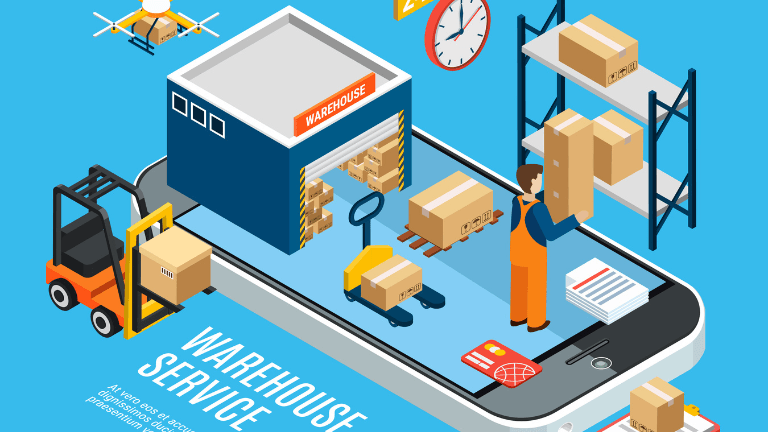LOGISTICS
Understanding Integrated Logistics: Key Concepts and Advantages
10 Apr 2025, 4 MINUTE READ
Every product you purchase, from your morning coffee to the latest smartphone, has travelled a complex path before reaching your hands. Behind the scenes, a vast network of suppliers, manufacturers, warehouses, and transporters works in perfect balance to ensure seamless deliveries. But what keeps this complex system from falling into chaos? The answer lies in integrated logistics—a strategic approach that unifies all aspects of supply chain management into a smooth, efficient operation.
Gone are the days of disconnected processes and costly inefficiencies. Integrated logistics services leverage advanced technology, data-driven insights, and real-time coordination to streamline everything from inventory control to last-mile delivery. But how does it all come together, and why is it a game-changer for businesses? Let us break down the key concepts and explore the undeniable advantages of this modern logistics revolution.
What is Integrated Logistics?
Integrated logistics refers to the strategic coordination of multiple logistics functions—such as transportation, warehousing, inventory management, and order fulfilment—into a unified system. Rather than operating in isolation, these components work in harmony to enhance efficiency, reduce redundancies, and improve service levels.
Integrated logistics management focuses on optimising fleet management, refining route planning, and ensuring effective load consolidation. This approach enables real-time collaboration among stakeholders, leading to faster deliveries, cost savings, and better resource utilisation. By leveraging data-driven decision-making and advanced technological tools, businesses can transform their logistics operations into a well-orchestrated system that minimises delays and maximises efficiency.

Key Components of Integrated Logistics in Road Transport
The major components that build the base of integrated logistics are mentioned below.
1. Fleet Management
Efficient fleet management is at the core of integrated road transport logistics. It involves the optimal utilisation of vehicles, reducing idle time, and enhancing fuel efficiency. Advanced telematics systems and GPS tracking allow real-time monitoring of shipments, helping businesses optimise vehicle deployment, improve driver productivity, and reduce maintenance costs.
2. Route Optimisation
Smart route planning plays a pivotal role in minimising transit time and fuel consumption. By leveraging AI-driven tools, logistics providers can identify the most efficient routes, avoid congestion, and reduce unnecessary mileage. Dynamic route optimisation ensures adaptability to unforeseen disruptions such as traffic jams or road closures, thereby improving delivery reliability.
3. Inventory Synchronisation
Integrated logistics company bridges the gap between warehousing and transportation by ensuring that goods are dispatched precisely when needed. This synchronisation helps prevent overstocking or understocking, reducing storage costs and ensuring that inventory levels align with customer demand. A well-coordinated logistics system minimises delays and enhances overall supply chain efficiency.
4. Technology Integration
The adoption of automation, AI-based tracking, and cloud-based logistics platforms is revolutionising road transport logistics. Digital tools provide real-time shipment visibility, streamline communication between supply chain partners, and enable predictive analytics to anticipate potential disruptions. By integrating these technologies, businesses can make data-driven decisions that improve efficiency and reduce operational risks.
5. Customer-Centric Approach
Today’s customers demand real-time tracking and timely deliveries. Integrated logistics enhances customer satisfaction by providing transparent shipment updates and ensuring on-time deliveries. The ability to proactively address delays and improve service reliability fosters stronger relationships and builds brand loyalty.
Advantages of Integrated Logistics in Road Transport
By integrating logistics processes, companies can experience multiple integrated logistics benefits that enhance operational efficiency and profitability.
1. Enhanced Operational Efficiency
Integrated logistics eliminates redundancies and streamlines operations by ensuring that all elements of the supply chain work in harmony. Road transport networks benefit from optimised route planning, improved vehicle utilisation, and reduced turnaround times.
2. Cost Reduction and Profitability
By minimising inefficiencies in transport, warehousing, and inventory management, businesses can significantly reduce costs. Optimised vehicle loading, route planning, and reduced idle times lead to fuel savings and lower transportation expenses.
3. Improved Supply Chain Visibility
Real-time tracking and data analytics provide logistics managers with better control over transport operations. GPS tracking, telematics, and IoT-enabled monitoring ensure that goods are delivered on time, reducing disruptions and improving supply chain resilience.
4. Faster and More Reliable Deliveries
Integrated logistics enhances delivery timelines by optimising transportation routes and minimising bottlenecks. Predictive analytics and AI-driven route planning help reduce delays and ensure just-in-time (JIT) delivery schedules.
5. Strengthened Customer Satisfaction
A well-integrated logistics network results in better customer service, as businesses can provide accurate delivery estimates, reduce transit time, and offer real-time tracking. This enhances trust and customer loyalty in the long run.
Summing Up
As businesses continue to expand across borders and customer expectations evolve, the role of integrated logistics will only grow in significance. The future lies in hyper-connected, technology-driven supply chains that utilise AI, automation, IoT, and blockchain to create unprecedented levels of efficiency, transparency, and agility. Companies that embrace these advancements will gain a competitive edge, reducing costs while enhancing service reliability.
Moreover, sustainability will be a driving force in the next phase of logistics integration. Businesses will increasingly adopt green supply chain practices, optimising routes, reducing carbon footprints, and leveraging renewable energy solutions to meet both regulatory requirements and consumer demands for eco-friendly operations.
The way forward is clear—logistics is no longer just about movement; it is about intelligent, sustainable, and adaptive systems that can anticipate disruptions and respond proactively. Organisations that invest in smart, integrated logistics solutions today will be the ones shaping the future of global trade and supply chain management.
Related Insights
LOGISTICS
3PL vs 4PL: What You Need to Know to Choose the Best Option?
30 Apr 2025, 6 MINUTE READ
LOGISTICS
Understanding Integrated Logistics: Key Concepts and Advantages
10 Apr 2025, 4 MINUTE READ
LOGISTICS
How to Avoid Delays and Penalties in Road Freight Services?
3 Mar 2025, 6 MINUTE READ
LOGISTICS
Strategic Vehicle Distribution: Enhancing Accessibility Across Key Hubs
6 Jan 2025, 4 MINUTE READ
LOGISTICS
Transporting Traditions: The Logistics of Seasonality During Festivals
7 Nov 2024, 5 MINUTE READ
Drive efficiencies throughout your supply chain with our technology-enabled services
View Services